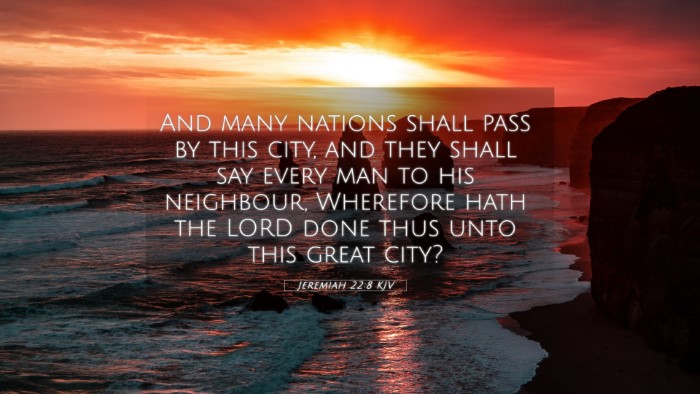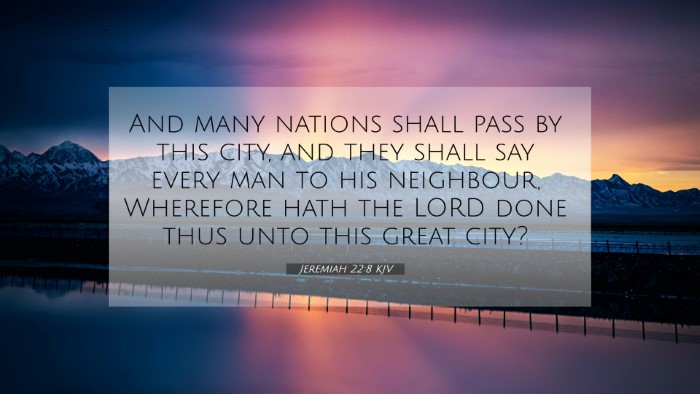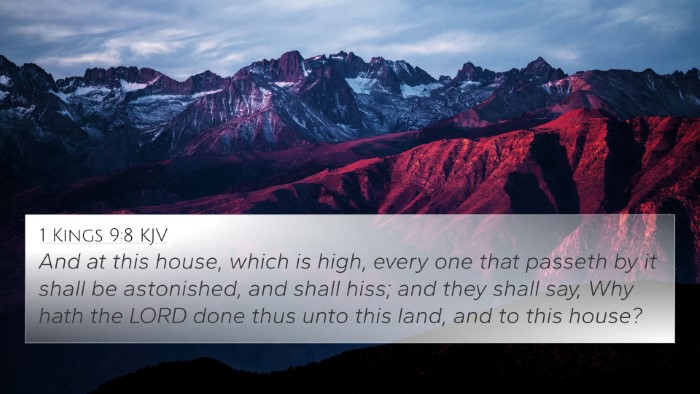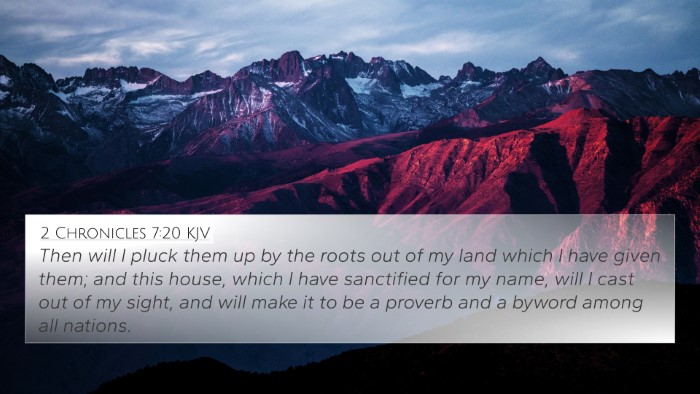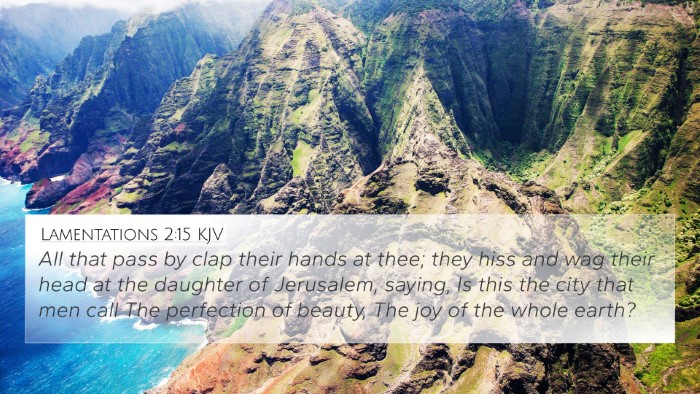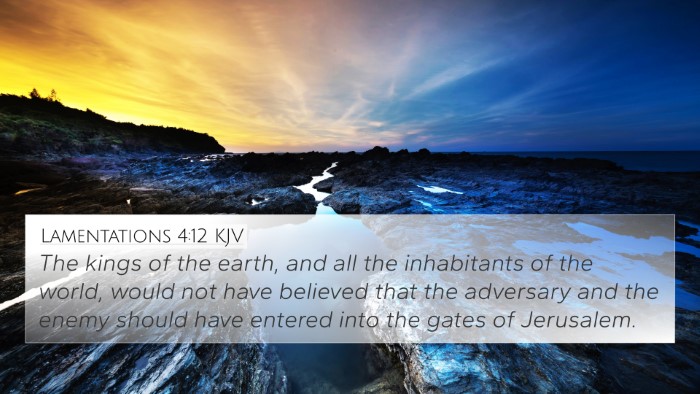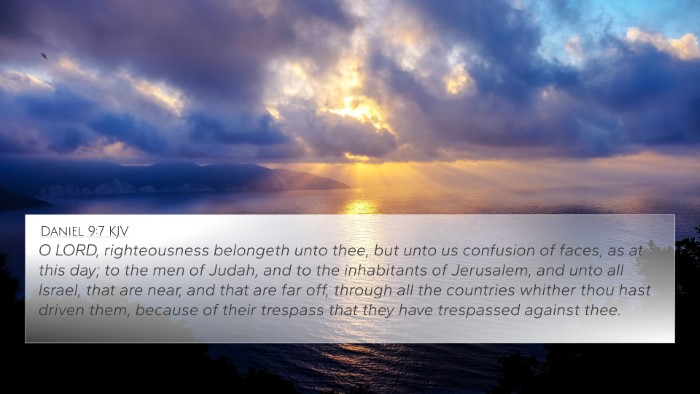Understanding Jeremiah 22:8
Jeremiah 22:8 states, "And many nations will pass by this city, and everyone will say to his neighbor, 'Why has the LORD done such a thing to this great city?'" This verse is a proclamation about the consequences of Judah's disobedience and serves as a warning. The insights provided by various public domain commentaries help us to dissect and understand the deeper meanings behind this verse.
Context and Background
The context of this verse is rooted in the prophetic ministry of Jeremiah, who warned the nation of Judah about impending judgment due to their idolatry and rebellion against God. This chapter focuses on the downfall of the monarchy and the ensuing desolation of Jerusalem.
Insights from Commentaries
-
Matthew Henry:
Henry emphasizes the universal notoriety that Jerusalem's devastation would bring. He highlights that nations observing the ruin would question God's judgment and the reasons behind such an excessive punishment, indicating a break in the covenant relationship between God and His people.
-
Albert Barnes:
Barnes discusses how this verse indicates the astonishment that surrounding nations would feel upon witnessing the destruction. He explains that it reflects both God's sovereignty and the seriousness of His judgments, showcasing the dire consequences of abandoning divine commandments.
-
Adam Clarke:
Clarke brings attention to the rhetorical nature of the verse, suggesting that it serves not only as a warning but also a means of drawing the attention of the people to their moral and spiritual failure. He notes that this inquiry from neighboring nations serves a dual purpose: to reinforce the seriousness of the kneeling state of Jerusalem and as a collective lament.
Cross-References to Jeremiah 22:8
This verse is interconnected to various passages throughout the Scriptures that discuss themes of judgment, exile, and the consequences of sin. Here are some notable cross-references:
- Jeremiah 9:12: "Who is the wise man that may understand this? And who is he to whom the mouth of the LORD has spoken, that he may declare it?"
- Jeremiah 25:9: "Behold, I will send and take all the families of the north, says the LORD, and Nebuchadnezzar the king of Babylon, My servant..."
- Lamentations 1:1: "How lonely sits the city that was full of people! How like a widow is she, who was great among the nations!"
- Ezekiel 5:14: "Moreover I will make you a waste and a reproach among the nations that are all around you..."
- Isaiah 64:10: "Your holy cities are a wilderness, Zion is a wilderness..."
- Jeremiah 44:22: "So the LORD could no longer bear your evil deeds and the abominations which you committed..."
- Hebrews 10:31: "It is a fearful thing to fall into the hands of the living God."
Connecting Thematic Elements
The thematic connections between Jeremiah 22:8 and other scripture highlight God's judgment, His desire for repentance, and the eventual restoration of His people. Understanding these connections provides a clearer perspective on the overarching narrative of divine justice and mercy, showcasing how these themes interweave throughout both the Old and New Testaments.
Structural Analysis
-
Judgment: The devastation of Jerusalem illustrates the consequences of turning away from God.
-
Public Recognition: The nations' inquiries about Jerusalem's fate signify a loss of reputation and divine favor.
-
Call to Repentance: Implicit in the questioning is a call for reflection on their actions which led to such downfall.
-
Restorative Hope: As much as this verse encapsulates judgment, it is also rooted in God's desire to restore His people if they return to Him.
Tools for Bible Cross-Referencing
For individuals wishing to explore the connections between biblical texts, several tools for Bible cross-referencing, such as a Bible concordance or a cross-reference Bible study guide, may provide significant assistance. These resources help in identifying themes and narratives that resonate across verses and books, illustrating the interconnected nature of the Bible.
Conclusion
In summary, Jeremiah 22:8 serves not only as a statement of judgment but also as a profound reflection on the consequences of moral decay within a community. The ensuing questions from neighboring nations encapsulate the astonishment at God's workings and call us to consider our own relationship with Him. The insights gleaned from the commentaries and cross-references reinforce the Bible's cohesive narrative and emphasize the significance of understanding scriptural context and themes holistically.

